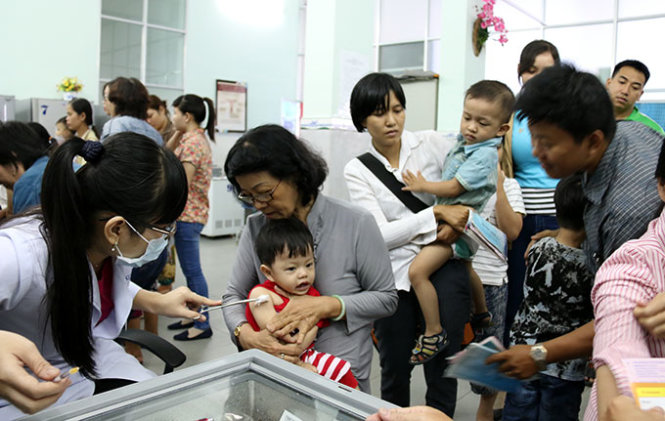Four local firms are taking steps to produce at least five vaccines, including the combined 5-in-1 and 6-in-1 shots, that are in great demand in Vietnam under a large project, according to the head of a company affiliated with the Ministry of Health.
>> An audio version of the story is available here This project is one of the national product programs run by the Ministry of Science and Technology, Do Tuan Dat, director of the Vaccine and Biological Production Company No. 1, said in a recent interview with Tuoi Tre (Youth) newspaper. Under this project, at least five vaccines will be produced, including a Vi-rEPA typhoid vaccine, a Japanese encephalitis virus vaccine made in Vero cells, a hepatitis A vaccine made in diploid cells, a 5-in-1 vaccine (against five diseases: polio, whooping cough, diphtheria, tetanus, and Haemophilus influenzae b (Hib)), and a 6-in-1 vaccine (for the preceding five diseases plus hepatitis B), Dat said. Of these vaccines, the 5-in-1 and 6-in-1 are really desired by families having babies, Dat said. Vietnam now has four vaccine makers, including Dat’s company, which are carrying out the project, he said. It is expected that the 5-in-1 and 6-in-1 vaccines will be tested in 2018, Dat said. Currently, the country is facing a shortage of the two combined vaccines, said Tran Dac Phu, head of the health ministry’s Preventive Health Department. Vaccine makers have committed themselves to providing Vietnam with 530,000 doses of 5-in-1 and 6-in-1 this year, but the amount is enough for only 170,000 children, far lower than the actual demand, Phu said. Dat emphasized that every vaccine marker is required to ensure their products’ quality and any vaccine must undergo tests to prove their safety and effectiveness. Vietnam has so far produced 11 of the 12 vaccines used in its national vaccination program, Dat said. Of these 11, the one against measles has been placed by the World Health Organization (WHO) among the vaccines meeting global standards, he said. Over the past ten years, Vietnam has adopted international benchmarks and processes in making vaccines, Dat said, adding that the WHO is taking steps to recognize Vietnam’s national regulatory authority for vaccine quality management. Upon such recognition, Vietnam will have a good opportunity to export its vaccines, Dat said.
Like us on Facebook or follow us on Twitter to get the latest news about Vietnam!
























































